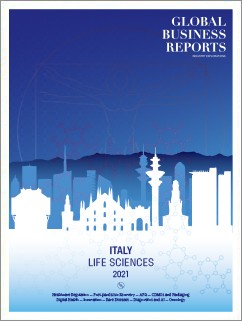
"We closed the financial year with a small profit, which makes us very proud considering that we only started operations in 2018."
RELATED PUBLICATION
Alan Zettin
CEO, DIACO BIOFARMACEUTICI
Can you provide an overview of Diaco’s history in Italy and highlight some recent developments?
Diaco was born in 1967 and has grown to become one of the key players in IV solutions in Italy. In the early 2000s, the company was bought by a family of Ukrainian investors who were looking for an entry door to the European market. Between 2014 and 2020, the new owners invested over €50 million on a complete refurbishment of the production site. Diaco re-entered the market in 2018 after receiving the AIFA authorization to restart production. We began developing our business through tenders, which is the main opportunity to access the Italian market, and we also started developing contract manufacturing capabilities with a German customer.
Can you familiarize our audience with Diaco’s portfolio and key markets?
Diaco offers IV solutions, a commodity product supplied to hospitals. Our medical devices reach two separate markets: the health industry and the cosmetic industry - principally aesthetic medicine and orthopedics. Our medical devices fall into four different sectors, but the first and most important one for us today is the orthopedic sector. We began commercializing these products in Italy last year, and in Poland, which is our first export market. Our broader pipeline has a diversified focus in urology, gynecology and respiratory products; we have started to sell these in Italy, and we will launch new products in urology and gynecology in Germany and the UK. Outside of Europe, Diaco is looking at the Middle East, particularly Iraq, as well as Mexico, as the next growth territories. Our main strategy is to secure long-term distributors that can guarantee the sustainability of the company, both in Europe and globally.
Can you describe your partnership with Hyalual for the distribution of aesthetic products?
Hyalual was created in Switzerland by the same Ukrainian family of investors as Diaco, who owns one of the top three pharmaceutical companies in Ukraine. What is special about our main shareholder is that they only keep 1% of the dividends and re-invest the remaining 99% of profits into R&D and marketing. Hyalual is focused on the use of hyaluronic acid, and its competitive advantage is based on the use of exclusive formulas and high-quality products. For instance, Shiseido, one of the world’s top-quality producers of hyaluronic acid, is the main supplier for Hyalual. Our goal is to have a high-quality product that can serve a sophisticated market.
Can you elaborate on Diaco’s CMO capabilities?
Our CMO capabilities are broadly focused on glass-based parenteral solutions. What marks us apart is a highly qualified team of experts with a background in leading pharmaceutical companies. We manage complex projects for external companies, customizing closely to their needs. Our first clients are German and Polish.
What is Diaco’s approach to sustainability and how does this translate at the production site?
Our choice material for parenteral solutions is glass, firstly because it is our owners’ core business, and secondly because we expect a greater shift from plastic back to glass in the long term. There are important initiatives at a European level on the use of plastic and Italy has already seen the introduction of plastic taxes.
We are in discussions with our glass suppliers – Bormioli and RDG – to try to improve the glass life cycle. Starting from our glass suppliers, the bottles reach hospitals, where they are passed on to waste management companies; this is where the waste company intervenes to sell the glass back again to our glass providers. We need to work on streamlining the process to reduce the time it takes for a bottle to reach a full life cycle.
What are Diaco’s priorities for the next 2-3 years?
Until recently, Diaco’s top priority was to surpass the break-even point, which we achieved in 2020. We closed the financial year with a small profit, which makes us very proud considering that we only started operations in 2018. Now we have the opportunity to seek financial investment from private and public financial institutions. Our aim is to strengthen our presence in Italy, which is challenging given that this is already a mature market. We are confident to position ourselves as a highly qualified and competent company with unique products. We expect 70% of our growth to be organic and 30% external.
Do you have a final message for GBR’s audience?
With our current portfolio, we can create value for our customers and for our company. Half of our laboratory team is qualified at the Ph.D. level, and we want to attract similarly high-qualified talent.











